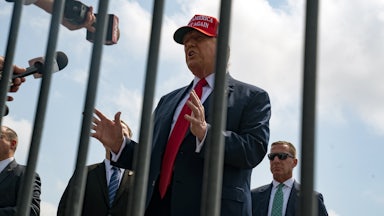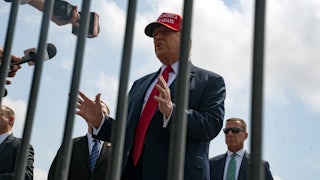Thursday’s oral argument in United States v. Trump might have been the most surreal session ever held in the Supreme Court’s 235-year history. At issue was whether past, present, and future presidents can commit crimes and get away with them. A majority of the justices appeared ready to give their assent.
The case sprang from former President Donald Trump’s efforts to overturn the results of the 2020 election by organizing fraudulent slates of electors and obstructing the January 6, 2021 count of electoral votes. Justice Samuel Alito, however, was more worried that the real constitutional crisis might arise from a president facing consequences for such misdeeds.
“If an incumbent president loses a hotly contested election and knows that there is the real possibility after leaving office that he may be criminally prosecuted by a bitter opponent, will that not lead us into a cycle that destabilizes the functioning of our country as a democracy?” he asked Michael Dreeben, who represented the Justice Department.
It is hard to say exactly how the justices will decide this case. The justices sparred over whether presidents can be prosecuted for official acts, in what circumstances, and whether certain presidential powers are off-limits. But there appeared to be at least five votes for some form of presidential immunity from criminal prosecution beyond the narrow terms conceded by the Justice Department. Some of the court’s conservative members seemed open to a much broader version as well.
In either event, the net result will likely be a practical victory for Trump. Naturally, the former president would be undoubtedly happy with a ruling in favor of his bogus immunity arguments. But those arguments mainly served as a delaying tactic to freeze the trial related to his election skullduggery and prevent a jury from reaching a verdict before the November election. There were no signs on Thursday that the court would decide this case quickly.
John Sauer, who argued on Trump’s behalf, appeared so certain of that victory that he declined the opportunity to give a rebuttal after the Justice Department finished its portion of the argument. I have never covered a Supreme Court case where a lawyer turned down that option to get a final word in; I am not aware of a similar move in any other argument in the modern format.
It was all the more striking because Sauer’s allotted time at the start of oral arguments was, to put it mildly, a trainwreck. He resisted the idea that federal prosecutors could charge a former president with a variety of serious criminal offenses. (The case does not address whether sitting presidents could be charged with federal crimes, as the Justice Department has disavowed that possibility.)
Most of the justices appeared skeptical at first. Could a president be indicted for accepting a bribe to appoint someone to a specific ambassadorship, asked Chief Justice John Roberts? No, Sauer said. Prosecutors would have to “expunge” the official acts from the indictment to bring it. That did not appear to satisfy Roberts, who noted that prosecutors would be effectively be charging a president without saying what he actually did.
Justice Amy Coney Barrett also hammered Sauer on the distinction between private acts, which he conceded could be prosecuted, and official acts, which he said were off-limits. Barrett read out loud a few portions of the federal indictment against Trump that detailed his efforts to prevent Congress from certifying the 2020 election result. Sauer agreed that her examples were private acts, which would mean the trial could go forward.
But it was his approach to the “official acts” that a president could get away with that raised the most eyebrows. “Let’s say this [hypothetical] president ordered the military to stage a coup,” Justice Elena Kagan asked Sauer at one point. “He’s no longer president, he wasn’t impeached, he couldn’t be impeached, but he ordered the military to stage a coup. You’re saying that’s an official act. That’s immune?”
Sauer hemmed and hawed before eventually stating that it would “depend on the circumstances.” In some of those circumstances, he argued, Congress would first have to impeach and convict a president for the official act before he could face a criminal indictment for it. As I’ve noted before, that’s not how the Constitution actually works. More importantly, it is also not how a coup works.
“What if the criminal conduct isn’t discovered until after he leaves office, so there is no opportunity for impeachment?” asked Barrett. “We say the Framers assumed the risk of under-enforcement by adopting these very structural checks,” Sauer replied. There is no proof of this, of course, but that appeared not to matter to the court’s self-proclaimed originalists.
Justice Sonia Sotomayor even posed a hypothetical where the president decided that his rival is corrupt and ordered the military to assassinate him. Would that be within the scope of his official acts in which he has immunity, she asked? “That could well be an official act,” Sauer replied. This would be a disturbing argument to make if Sauer’s client were a sitting president; it is also a bizarre one to make when his client is currently the political rival of the sitting president.
Some of the court’s conservative members had tough questions for Sauer. But they also articulated a constitutional vision where presidents would have broad impunity for committing otherwise criminal acts. Foremost among them was Justice Brett Kavanaugh. He has long argued for an expansive view of presidential power and executive privilege: Almost two decades before he joined the court, Kavanaugh argued that the Supreme Court was wrong to force Richard Nixon to hand over the Watergate tapes to a grand jury in 1974.
At one point, Kavanaugh suggested that federal criminal laws ought not to apply to presidents unless Congress adopts a “clear statement” suggesting that they do. That would conveniently allow the court to say that it’s Congress’s fault that presidents can commit crimes when Congress had no idea for the past two centuries that it should’ve been spelling this out. It also inverts how the rule of law works in a society of free people.
“I don’t understand why [Congress] would have to say in every criminal statute that the president is included,” Justice Kentanji Brown Jackson noted at one point. “I thought that was the background assumption.”
Justice Clarence Thomas asked at one point why presidents weren’t prosecuted for carrying out coups in the past. He cited Operation Mongoose, the CIA’s efforts under John F. Kennedy to assassinate and overthrow Cuban leader Fidel Castro in the early 1960s. Justice Samuel Alito asked whether Franklin D. Roosevelt could have been tried for ordering Japanese American internment.
Michael Dreeben, who represented the Justice Department, also said that Roosevelt could have been tried for the latter now that the court has overturned Korematsu v. United States. But this is all beside the point. There is an extremely obvious reason why neither Kennedy and Roosevelt were prosecuted in their post-presidential years: They didn’t have any.
Perhaps the most head-spinning use of history came when Kavanaugh asked about Gerald Ford’s pardon of Richard Nixon after the Watergate crisis. While he noted that it was widely criticized at the time, it was “now looked upon as one of the better decisions in presidential history, I think, by most people.”
Not quite! Most legal scholars have cited the Nixon pardon as direct evidence against presidential immunity. Its very existence implies that former presidents can be charged with a crime, and that past presidents have operated under that assumption. (Trump and his lawyers claim that everyone assumed presidents had criminal immunity until recently.) Some justices, such as Jackson, made the same point.
But Kavanaugh flipped it the other way around. He pondered in an exchange with Dreeben whether, under the Justice Department’s view of immunity, Ford might have hesitated from issuing it in the first place. “Could I be investigated for obstruction of justice?” Kavanaugh asked, speaking in Ford’s hypothetical voice. Dreeben noted that pardons would fall within a narrow range of core Article II powers that can’t be criminalized by the other branches of government.
The more obvious logical problem is that if presidents can’t be charged with crimes, Ford’s pardon wouldn’t have existed in the first place, and thus Ford wouldn’t be wondering whether he could be charged with a crime for issuing it. Kavanaugh somehow managed to interpret clear evidence against presidential immunity as proof that it would be prudent and necessary.
While Roberts took issue with some of Sauer’s points, he also appeared hostile to the D.C. Circuit Court of Appeals’ ruling against presidential immunity in all forms. The chief justice at one point described the D.C. Circuit as holding that a former president can be prosecuted because he’s being prosecuted right now, which would be a tautology.
But he also expressed concern about malicious prosecutions. “You know how easy it is in many cases for a prosecutor to get an indictment,” Roberts remarked to Dreeben, tacitly accepting Trump’s assertion that baseless prosecutions would inevitably occur without immunity. And at one point he seemed to assume that some form of presidential immunity existed by describing Dreeben’s position as “taking away immunity.” Dreeben quickly pushed back, saying there was no immunity to take away.
Justice Samuel Alito aired his practical concerns about the effects that a prosecution would have on a former president. “That may involve great expense, and it may take up a lot of time,” he warned. “And during the trial, the former president may be unable to engage in other activities that the former president would want to engage in, and then the outcome is dependent on the jury, the instructions to the jury, and how the jury returns a verdict and then it has to be taken up on appeal.” It was as if he had just learned how criminal prosecutions work for the first time.
It’s worth noting at this point that “presidential immunity” does not have any basis in the Constitution itself. The constitutional text describes a limited form of legislative immunity in the Speech and Debate Clause, proving that the Framers could have written down a form of presidential immunity if they wanted it to exist. And there is no history or tradition to support the notion of presidential immunity, either: simply because past presidents haven’t been charged with crimes doesn’t mean that current and future ones can’t be.
But the court’s conservative members appear willing to declare that presidential immunity exists anyway. This would not be the first time that they have rewritten the Constitution’s basic text to suit their own purposes this term. It hasn’t even been two months since the justices effectively wrote part of the Fourteenth Amendment out of the Constitution to clear a path for Trump to run for a second term this fall. Giving a green light for presidents to get away with as many otherwise illegal and corrupt acts as they can while in office would be even more damaging.
“We have a big case today at the Supreme Court on presidential immunity,” Trump told reporters outside the courthouse in Manhattan on Thursday morning before the arguments began. “A president has to have immunity. If you don’t have immunity, you just have a ceremonial president.” Unless the Supreme Court has a major change of heart behind closed doors before the end of June, Americans may have something much worse: a president who is effectively above the law.










